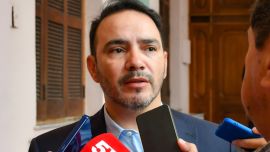President Alberto Fernández said Monday that he would be suing Patricia Bullrich for what he described as "disgraceful slander," following controversial statements from the PRO party leader alleging that government officials sought to squeeze a bribe out of US pharmaceutical giant Pfizer in return for signing a contract for vaccines against Covid-19.
"Democratic coexistence cannot authorise slander and lies being converted into accepted practice," said the president in a post on Twitter, describing the allegations as "absolutely false and hence unacceptable."
He said that Bullrich herself was well aware of the consequences of her claim, citing "the damage caused … also to civic confidence and the Republic’s institutions."
Bullrich, a former security minister in the Mauricio Macri administration who now chairs the former president’s centre-right party, had called for a criminal investigation to be opened earlier in the day after she alleged – without providing evidence to back up her claim – that graft was responsible for Argentina’s failure to agree a deal with Pfzier.
Speaking to the television channel LN+, Bullrich recalled former Health minister Ginés González García "saying that in order to sign a contract with Pfizer he needed a middleman, namely Hugo Sigman, linked to AstraZeneca. Pfizer said that was not possible since the vaccines were required right then and they needed to control the production. González García’s attitude was to try and squeeze a bribe.”
She then pointed the finger at Fernández, declaring “the president could not be ignorant of all this."
Bullrich’s reply to the presidential announcement of legal action was to tell PERFIL: "He is denouncing me for telling the truth," adding that he should be suing González García "for not signing the contract and leaving the country without 14 million vaccines … with the deaths continuing as a result."
“That was no mistake [the failure to sign a contract with Pfizer] but an attempt at graft which did not come off. I have no doubt that Ginés González García wanted a kickback on that vaccine," Bullrich charged.
"That’s criminal and should be investigated by national prosecutors. If you call up the Pfizer people, they will tell you the truth and not lies like Cabinet Chief Santiago Cafiero," she concluded.
However, Pfizer did not fall into line with the former minister’s expectations, issuing a brief communiqué that same afternoon denying Bullrich’s claims.
"Pfizer has not received requests for undue payments at any time. The company has no intermediaries, private distributors or representatives for supplying Covid-19 vaccine," the company said, while pointing out that under US legislation the firm was required to report any solicitation of bribes to the authorities.
Bullrich not only faces a presidential lawsuit – González García broke a long silence since his resignation last February to say that he would "denounce her in criminal courts, denounce her in civil courts or whatever it takes because I’m not going to let such a barbarous statement like that go by," in dialogue with Radio Con Vos.
He added that Bullrich’s accusations of graft and middlemen were made "with no evidence besmirching the honour of people without even offering the slightest proof which she does not have."
González García underlined that he had not spoken out even to defend himself over the so-called “VIP vaccine” scandal which had ejected him from office, pointing out: "No friend of mine was vaccinated."
Returning to the subject of Pfizer vaccines, González García explained: “The government continues negotiating with Pfizer because we want to turn this around. We had great faith in them because they came first, way ahead in their research, so that in our struggle to vaccinate Argentines as soon as possible, we naturally could not rule out a company like that. They got the law they wanted, Congress added that word ‘negligence’ which wasn’t there in the original and that’s where all the difficulties started."
Regarding Argentina’s negotiations to acquire vaccines, the ex-minister said: "We never wanted to work with a single supplier … and it’s also true that the difficulties in coming up with the required volume not only apply to Argentina but also to many countries which were expecting important quantities. I wanted any and every vaccine. We were desperate."
Speaking on the current restrictions, he pointed out: "The good news is that in contrast to what happened other times or when we tried to make the measures less restrictive, this time there is a high degree of compliance because without it, no vaccine suffices. To prevent cases, we have to avoid transmission which is achieved by circulating less. Even if we vaccinated everybody tomorrow, there is a lag of a fortnight before the vaccine takes effect so that would not work either. We have to act now and try to cut the chain of transmission."
At the time of writing, the row was still rumbling on, with Bullrich showing no sign of backing down.
The PRO leader on Tuesday asked Fernández to host her for a meeting to "explain" why the deal with Pfizer had fallen through. She claimed she had "all the information" on the issue (again without providing evidence) and that she would go to court to "tell the truth." "The president should analyse and judge those who did not sign a contract," she said.
– TIMES


























Comments